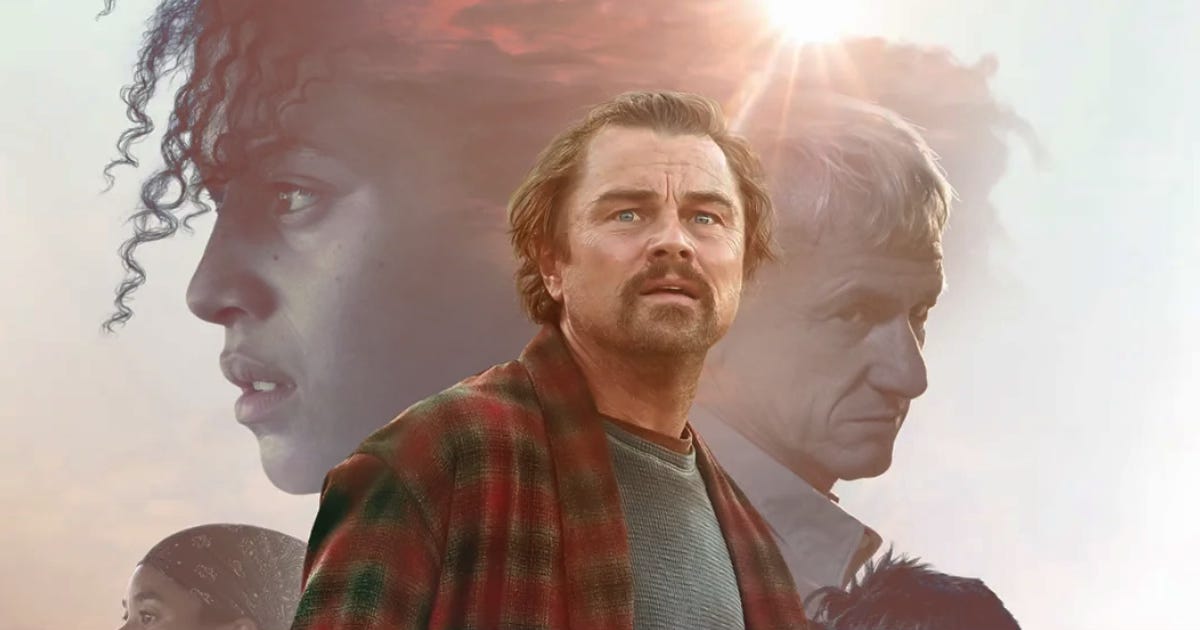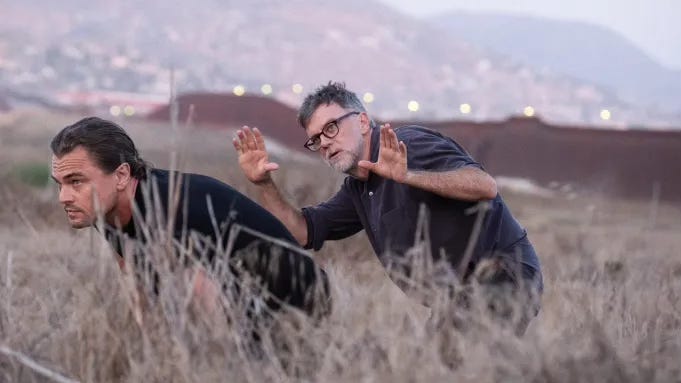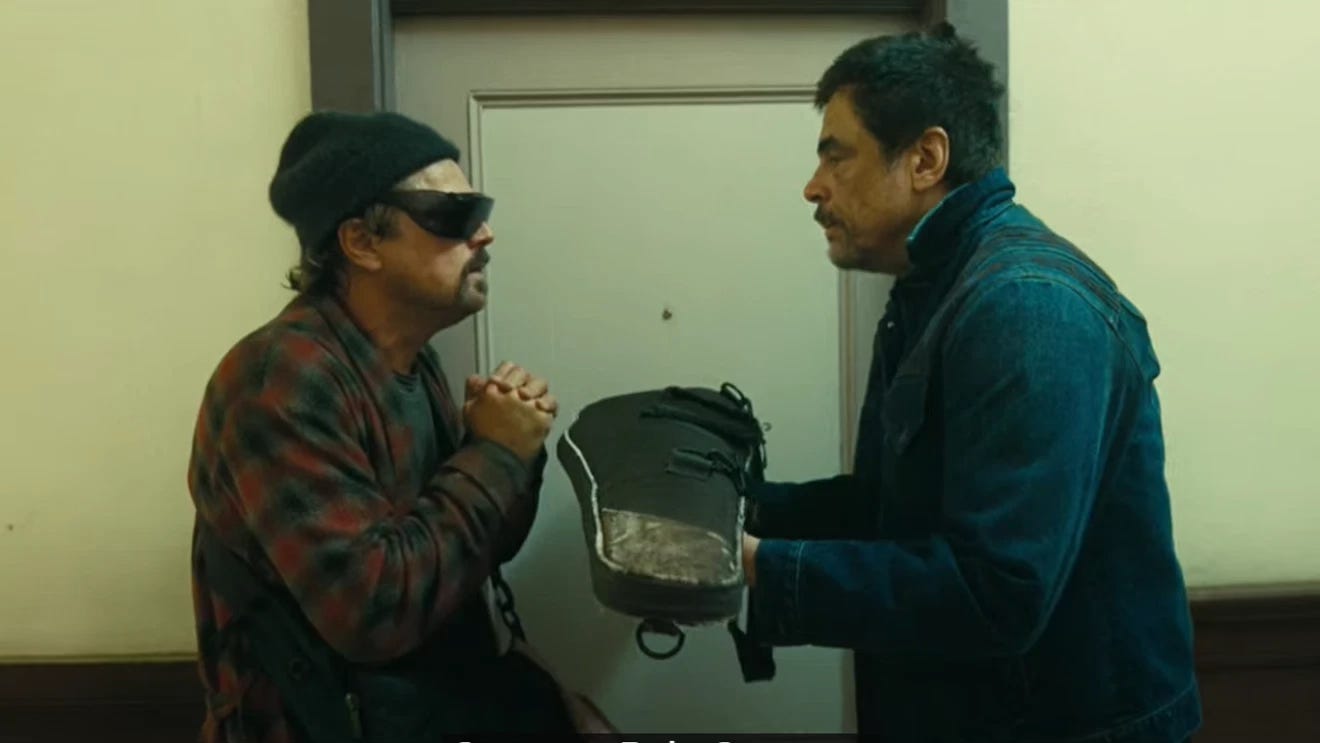'One Battle After Another': An Enduring Hallmark of the Times
Paul Thomas Anderson adapts a tale of modern politics and vast conspiracies as a vehicle to tell another story of love, resilience and fatherhood in his grandest and most accessible film to date.
“When power corrupts, it keeps a log of its progress, written into that most sensitive memory device, the human face. Who could withstand the light? What viewer could believe in the war, the system, the countless lies about American freedom, looking into these mug shots of the bought and sold?” - Thomas Pynchon, Vineland
Earlier this year, on the way home from a movie, I made a remark to my friends: “Why does it feel like nobody makes movies about the times we are living in?” Since then, it seems like every big movie that’s come out is exceedingly relevant. 2025 finally became the year we began to reckon with the Now. Ryan Coogler’s Sinners riffed on the modern tension of assimilation versus appropriation through a hundred-year old lens. Eddington, Ari Aster’s best film yet, was a two-and-a-half hour diagnostic of our collective freefall into insanity. Zach Cregger’s Weapons was a horror film about the way trauma and ever-increasing divisions affect small town America. Part of what made that film so great was the direct inspiration it took from Paul Thomas Anderson’s 1999 epic Magnolia; it followed its narrative structure and threaded character arcs but unlike Anderson, known to critics and acolytes alike as a relatively anachronistic and apolitical filmmaker, Cregger wrestled with the crumbling modernity of it all. But all these movies were usurped in greatness by Anderson himself with this month’s release of One Battle After Another, an adaption of Thomas Pynchon’s 1990 novel Vineland and his most urgent, political and modern film of his career, a generational tale of rhapsodic revolutionaries, tragic turncoats and the invisible hand of timeworn American evil. But what makes it good is not its relevance as much as its timelessness, and that its cultural commentary is only one part of the film and exists solely to provide a canvas for Anderson to tell us what he’s been telling us his whole career: love conquers all. Unlike most of its contemporaries this year, Anderson has something to say about the topical nature of Now, instead of just summarizing it.
Overwhelmingly positive reviews are rolling in, and many of them rightfully reference its renegade essence, but One Battle After Another isn’t quite as revolutionary as some say, though it is Anderson’s most aggressively political film, at least compared to the rest of his oeuvre (I can’t remember any other of his movies that utilize Gil Scott-Heron the way this film does.) It’s pro-revolution and anti-capitalist in nature, but it’s more about the righteousness of rebellion and the culture it spawns, and instead of being about how revolution works, it’s about how the energy and altruism of rebellion could truly work someday. The film takes place, mostly, sixteen years post-revolution, when the rebel group French 75 liberates immigration camps and blows up federal buildings, and aside from main character Bob Ferguson (Leonardo DiCaprio) and his daughter Willa (Chase Infiniti)— who are already relegated to living in Kaczynski-esque paranoid quietude in a northern California sanctuary city— most of the revolutionaries are dead or in jail or, in the case of Willa’s mother Perfidia Beverly Hills (Teyana Taylor), turncoats. Summarily, the revolution failed and with it so did their lives. And, even so, the uprising that takes place in the movie is on a grander and more cohesive scale than anything that’s actually happened in modern America, painting a more roseate picture than anything modern leftists have done, more akin to the delusional dreams of what conservative Americans think the modern left is than what they actually are. In fact, an argument can be made that this film takes place in a similar but parallel universe to our own. It’s a universe where evil has won even more so than the reality we’re familiar with. Small moments in the movie— like when Lockjaw is awarded a police medal named after KKK founder Nathan Bedford Forrest or the reveal in the credits that the army is named after Mankind United, a depression-era California cult that claimed a sweeping malevolent conspiracy ruled the world— point to the idea that this is an alternate reality where the virulent racists and tin foil hat, cabal-seeking lunatics came out on top. In a historical context these entities did not “win”, but Anderson tells us that maybe, in spirit, they did.
But in the universe of One Battle, the underground network still persists a decade and a half later. At the movie’s end, when Willa (who finds out her father has been feeding her lies about her mother her whole life) escapes the clutches of her cop-slash-biological-father, Steven Lockjaw (Sean Penn), a caricaturistic stand-in for The Man, the last scene of the movie shows her donning inconspicuous clothing and marching out of the house to continue the revolution, just like her mother once did. And, as viewers, despite all the evidence in front of us, we are inclined to believe that maybe this time the revolution will work, because for all the law and artillery on the side of the elite, the revolutionaries are armed with something infinitely more profound and important: love. Viva la revolución, indeed. In this dichotomy of good versus evil, it’s clear to see which side Anderson stands on. The strong arm of power is soulless and empty, and because of that, there is a sense of fragility to everything they do. They are quiet and removed though they hold up America’s caste system. Despite his grotesque evil, even Steven Lockjaw himself is too human to ever be truly a part of that silent elite; he carries out their deeds and follows through with their messaging, but will never truly be one of them, only a pawn in the game just like the people he hates and hunts. It is this feeling— this Eyes Wide Shut cabal of invisible evil that uses otherwise normal civilians who aspire to become elite but never stand a chance to carry out their crimes— that makes Anderson’s latest film truly capture what Pynchon was trying to tell us thirty five years ago.
“He’d caught a fatal glimpse of that level where everybody knew everybody else, where however political fortunes below might bloom and die, the same people, the Real Ones, remained year in and year out, keeping what was desirable flowing their way… no matter how much money he made, how many political offices or course credits from charm school might come his way, no one of those among whom he wished to belong would ever regard him as other than a thug whose services had been hired.” - Thomas Pynchon, Vineland
Pynchonian in feel— even more so than his other direct Pynchon adaptation, Inherent Vice, which was more faithful in content to its source material— it is otherwise a massive departure from the novel. For one, it takes place in a sanctuary town called Baktan Cross instead of the eponymous Vineland. There are no Thanatoids or UFOs or otherworldly tow-truck drivers ferrying miscreants to their death. The character names are all different, even if they’re analogs to the original. The novel opens with Zoyd Wheeler (the counterpart to DiCaprio’s Bob Ferguson) dressing up in drag and jumping through a fake glass window to ensure he continues to receive his disability check, while the movie opens with a fast-paced, rapturous twenty-minute sequence of The Old Days, a threaded story of illicit love and intoxicating rebellion that sets the movie up chronologically, a good choice to streamline the viewing experience and drive excitement but nonetheless a significant departure from the book. Vineland also takes place in the late eighties, its cast of characters threadbare former flower children turned Reagan voters and FBI informants. It is personal to Pynchon, once somewhat of a hippie himself, reckoning with the sad truth that the politics of the hippie movement were meaningless and, at times, self-serving, and only the older generations and countercultural enemies could see this endpoint coming. Pynchon posits that The Man won. He looks deep into the void and bleakly returns to tell us that the surveillance state is here to stay. Pynchon feels there is an innate human desire to bow down to authority, and rebel movements— while honorable— are always liable to crumble because we have an innate penchant for self-sabotage and dissolution. One Battle After Another sees Anderson view rebellion and struggle in a more positive, hopeful light, something we need right now as a people even if it’s not completely true. The end of the film shows Bob and Willa finally escaping the shackles of the State— or maybe not, but they are now going to live life on their own terms, Big Brother be damned. Anderson even moves the entire story three and a half decades forward, at once a bleak and earnest truth that life is cyclical, nothing ever really changes, and like Faulkner said, “the past is never dead. It’s not even past.” We can see Willa turning into her mother; it’s not surprising when we remember early in the film, when it fast forwards to the present and the narrator says “Sixteen years have passed. Not much has changed.” And while the idea that oppression and its subsequent rebellion both need each other to thrive, and still exists all the same in rapidly shifting cultures, it gives both Pynchon’s novel and Anderson’s movie a sense of timelessness, that though this is art of the Now, it is also the art of Forever.
Even the characters themselves in the film and their motivations are different from its source material. Pynchon explains away Frenesi Gates’ (the Perfidia Beverly Hills analog) turn to rat with the allure of power and the fear of death, while Anderson gives Perfidia less of a pass, painting her as an absentee mother whose naïveté was her ultimate downfall (there may be some critical analysis on the way that Anderson, an older white man, paints a young black revolutionary in such a negative light, but that is not for me to decide.) On the flip side, Bob Ferguson is framed more warmly if just as incompetent as his analog, Zoyd Wheeler; Bob is not a revolutionary in the truest sense of the word. He is a victim of the situation he found himself in, an explosives expert dating a woman who spearheaded a movement. He was just along for the ride, but when he became a father, was content throwing it all a way for a quiet life of domesticity. But that love Bob has in his heart for his family is precisely what makes him a good revolutionary, better than the mother of his child; he treats his found family with respect and admiration, and it comes as no surprise to viewers when Perfidia’s hotheaded brazenness becomes her own undoing, and sixteen years down the road, despite being perma-fried and physically removed from the revolution, Bob is still down with the cause, because love conquers all. This is also what makes Bob a good father, and fatherhood is what One Battle After Another is really about.
So, the revolution didn’t work, but the underground network is still alive, so things don’t feel hopeless. Besides, Bob got to watch his daughter grow up, and despite falling into a life of weed-smoking and drunk-driving, he seems content. This is always what he would’ve chosen. And when the powers beyond his control threaten to take that from him, he snaps into his old self the best he can (though he’s older and less sharp than he used to be) in an endearingly spirited if a bit incompetent attempt to get his daughter back— even if most of the hard work is done by Willa herself, in an extended sequence of action scenes in which Chase Infiniti acts laps around the rest of the star-studded cast. Bob never finds out that he is not Willa’s biological father, which begs the question if Willa will ever tell him, but it is a moot point. It is clear that Bob’s vision of family runs deeper than blood, and a DNA test will never make Willa not his daughter. Love abounds, and that means he will never stop seeking truth and striving for justice.
Paul Thomas Anderson has never been a revolutionary but he was once a rebel, a coked-out young prodigy who flexed his muscles as an auteur from his early twenties, giving the world complex characters embroiled in ethical dilemmas with considerable moral baggage. And though his movies have evolved as he has calmed down and settled into his masterful storytelling and cinematic form, Anderson has always told us stories about family. The first half of his career was spent grieving his fleeting youth and dying father. Magnolia is about families that fracture and the harm our parents do to us. Boogie Nights is also about finding bloodless family in unlikely places, thematically parallel to his most recent work. Throughout his career, though, that love and family dynamic switched from youthfulness to parenthood as Anderson himself has grown up and started a family. There Will Be Blood, the story of capitalist greed and dynasty building, is a masculine tale of fatherhood. The Master is about two lost souls searching for a surrogate father and son respectively, and find it, like Leopold Bloom and Stephen Dedalus in Joyce’s Ulysses. And, now, One Battle After Another grapples with fatherhood in a different way: now he’s the one passing his baggage onto his children, not the other way around. Father Time comes for us all and the cycle continues. What was once a man who rebelled against the elders has become one himself whether he likes it or not. Like Pynchon says in Vineland: “These people had known their children after all, perfectly.”
One Battle After Another is indeed a new step in the illustrious and legendary career of our generation’s greatest director, his biggest budget yet, an action movie with exhilarating car chases and Searchers-like maddening desert mirages and a tight, frenetic pacing that will appease a wide audience. Anderson might get that first Oscar after all. It’s clear he wants to. But, distilled to its true essence, this is just as Paul Thomas Anderson as any Paul Thomas Anderson movie ever, only on a grander scale. It’s about how we wrestle with the absurdity of life with all its warts, its struggles and the paranoia. It’s about the America we live in today; at the movie’s end, when Willa, a mixed-race aspiring sensei teenager with a broken but loving family unit confused about her identity, is about to embark on a revolutionary career of her own, we see her ride out into the California fog, set to Tom Petty’s “American Girl”. It’s obvious and it’s perfect.
One Battle After Another is also about finding light in darkness. It’s a family tale. It’s about how love makes us better; here, an unlikely apparition of Anderson’s past work appears, Barry Egan, in the climactic scene of Punch-Drunk Love: “I have a love in my life. It makes me stronger than anything you can imagine.” We must reckon with the carnage we leave in our wake and leave this world better than we found it for the sake of our children. This film tells us that if we have enough love to give, maybe we’ll be OK.



